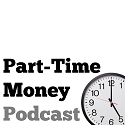034: Buying Your First Home with Lauren Bowling of Financial Best Life
 Lauren Bowling is the award-winning blogger and editor behind the personal finance site Financial Best Life and author of The Millennial Homeowner: A Guide to Successfully Navigating Your First Home Purchase.
Lauren Bowling is the award-winning blogger and editor behind the personal finance site Financial Best Life and author of The Millennial Homeowner: A Guide to Successfully Navigating Your First Home Purchase.
In this episode, Lauren and I talk about breaking big financial goals down into small steps, her experience in financial therapy, her success with paying off $10,000 debt from shopping, the 50/30/20 budgeting method, working with LearnVest, and buying her first home.
This is a great interview. Very open, honest, and real. So let’s dig in. Let’s meet today’s Master of Money…
Listen to This Episode with Lauren
- Listen to it on iTunes.
I hope you enjoyed that. A big thank you to Lauren for giving us the gold today.
Share on Twitter
Setting and Reaching Goals
Goal setting is one piece of the puzzle that Lauren says a lot of people are missing. Taking a big goal and breaking it down into smaller action steps that create a road map to getting where you want to go can make a huge difference in your finances.
Not everyone is great at setting and achieving goals, but Lauren says it has always come fairly naturally for her. A stint at a marketing and strategy firm further cemented skills she already possessed.
Lauren has shared many of her financial goals publicly on her blog, but she is best known for the goal she accomplished in 2015 when she paid off $8,000 in debt in just 90 days. That’s right, folks. $8,000 in 90 days.
How to Set Realistic, Achievable Goals
Lauren says that in order for goals to work, you have to be very clear on what you want, and have a specific timeline on when you want it to happen.
The other obstacle to setting goals is when the goal is so large that just thinking about it seems too hard. Have you ever had a goal so big that you couldn’t even conceive of how you could possibly reach it? Let’s talk about some tips to help you set goals.
- Have a set time. Whether this is monthly, weekly, or quarterly, it needs to become a regular part of your routine.
- Set up accountability. If you blog, consider publishing your goals. If not, get a friend or family member with whom you can share your goals and who will celebrate with you as you meet them.
College Graduate and Deep in credit Card Debt
An addiction to shopping in college landed Lauren in therapy for a season, but coming out of that she knew what her spending triggers were and she was determined to never find herself in that place again.
She came out of college with $10,000 in credit card debt and a burning desire to move to New York City to use the theater degree she had earned. That debt was just hanging over her head and she was really hoping her parents would bail her out as they had done in the past.
But they weren’t doing it this time.
Lauren now is a self-described minimalist. Working through her need for spending and what led to those behaviors was life changing for her. Her lifestyle habits had to change drastically in order for her to be successful and stay out of debt. Not going to stores when she’s having a bad day, unsubscribing from catalogs, and not receiving emails about store sales are just a few things Lauren has to do to remain in control of her spending.
“Nobody talks about how great it feels to shop…how sexy it feels. It’s a great feeling to swipe that card and buy pretty things…always thinking you’ll take care of the debt in the future…” ~Lauren Bowling
Watching Others Live the Life You Want
After therapy and after stopping credit card usage, Lauren had better control over her spending but she wasn’t completely on board with being mastering her finances.
She did end up moving to New York City, with only $300 in her pocket. Oh, and the $10,000 in credit card debt. And that debt determined her lifestyle. She couldn’t live the “actor’s life”, working a few hours at a coffee shop while attending auditions. She had to get a real job working at a desk for 12 hours a day.
And all that just to pay the minimums on her credit cards. She was sleeping on friends’ couches and watching them live the life that she wanted to live. She knew then that it was time to master her money, in order to do what she wanted to do. So she set out to pay off the $10,000.
Which she did in 14 months while living in New York City.
Budgeting for Beginners
When Lauren decided to pay off her debt in order to go after the life she wanted, she used something called the 50-30-20 budgeting method.
If you aren’t familiar with the 50-30-20 budget, it’s basically a way to split your money into just 3 categories per month in order to simplify your budget tracking. Simply put, 50% of your income goes to needs and fixed expenses; 30% goes to savings or debt repayment; 20% goes to spending money.
During the debt repayment, Lauren did not have any type of side hustle she was working. In fact, she didn’t start a side hustle of any kind until after she had started blogging and began reading other bloggers talk about how important a side hustle was to master their money.
When Nobody Is Talking About Money
As Lauren began using the budget and seeing some headway in paying off her debt, she really wanted to talk to others about that and about money in general. None of her friends talked about money though, and seemingly had no interest in it.
Lauren was feeling so inspired by what she was reading and learning over at the Learnvest blog that she decided to start her own blog where she could talk about money to her heart’s content. Once she started, a whole community of financial bloggers opened up to her.
Finding a New Career
Once the debt was paid off, Lauren turned her attention to the acting dream she had nurtured for so long. But she found that she no longer felt the same about it. So she moved back home to her parents’ house outside of Atlanta.
With the goal of acting gone and knowing that she didn’t want to continue as an administrative assistant, Lauren found herself not knowing what to do next. She was job hunting, but without a real idea as to what she wanted to do.
It was then that she started her blog and she also was able to get hired to manage a blog and social media for a local tech start-up. All of this spawned a career in marketing which she loves.
Moving Forward Without Steady Income
When Lauren left her job in NYC, she had a large bonus that was paid out in increments so that she did have some income coming in.
Starting the blog was looking like a very good thing too. People were showing interest and her readership was growing. She continued to do some work for start-ups in the area until her blog could become a legit side hustle.
Making Money Mistakes After Debt Payoff
After a couple of years writing the blog, Lauren was engaged and she and her fiance decided to purchase a house. Housing prices were still low in the Atlanta area in 2013 and with some down payment assistance, they were able to buy a “fixer upper” for just $1,800 out of pocket.
Unfortunately, a shady contractor cost Lauren a lot of money on the home improvement he was supposed to be doing. She had received a 203k home improvement loan, but the contractor burned through the money she had borrowed before he had completed the work that needed to be done on the house.
In the meantime, her engagement broke off. Lauren felt like everything was just slapping her in the face. She was overwhelmed with the personal situation, and with the fact that while she was writing a personal finance blog, her own money was bleeding out every crack it could find.
It was all of this that compelled Lauren to write her first book, The Millennial Homeowner: A Guide to Successfully Navigating Your First Home Purchase. She wanted to share all of the mistakes she had made in hopes of helping others avoid them.
Going Back into Credit Card Debt. Again.
In order to get the house she had bought livable, Lauren had to pull those credit cards back out that hadn’t been touched since college. She ended up with $8,000 on them that she just let hang there for about a year.
She didn’t tell anybody about it because she felt such shame over finding herself in the same spot yet again. She had worked so hard to set up good financial habits, and yet here she was, right back where she had started.
Getting Out of Debt in 90 Days
Lauren had two goals at this point: get rid of the debt and go full-time with her blog. Getting rid of the debt would be the last step of the frustrating process she had been through getting her home renovated. So she set a goal.
90 days. To pay off $8,000.
Why did she choose 90 days? She didn’t want to spend an entire year of her life paying it off. She wanted closure on this thing. 90 days was both aggressive and doable. She figured out how much that would mean she paid toward the debt monthly, and then she adjusted her budget to fit it.
She also increased her freelance work she was doing, frequenting job boards where she would write for pennies on the dollar. She asked everyone she knew if they had any type of work she could do. She basically became a “side hustle monster”. She was throwing every penny she could get toward the debt.
Taking the Blog Full-Time
Once the debt was paid, Lauren began to focus on her blog and freelance writing. She had what she calls a hybrid income model. But what happened is that her client work was taking the front seat and her blog was taking the back seat.
A year ago, she decided to bet on herself and make the blog her full-time income. And it was a great bet.
At the end of the year, she had made over $50,000 from her website. Brand sponsorships and affiliate sales have been the bulk of her income from the blog. She also started creating her own products and selling those.
Personal Finance Goals
Lauren has a lot of business goals for the upcoming year, but she still sets personal finance goals as well. Paying off her car is one of her big ones right now. Saving for retirement is another priority for her.
Eventually, she would love to pay off the mortgage on her home. It is currently a rental property that provides her with some income every month.
And even though Lauren hasn’t been able to save or invest at the same rate as some of her peers who have worked corporate jobs for the years since college, she is happy with where she is. She feels proud of where she has come, building her own business and owning a home.
Show Notes
- 01:05 The importance of setting goals (And Lauren paid off how much in 90 days?!!)
- 03:00 How to set realistic, achievable goals and what prevents people from doing so
- 05:30 Graduating from college with thousands of dollars in credit card debt
- 12:08 Moving to New York City with $300 in cash and $10,000 in debt
- 13:30 Using the 50-30-20 budget to pay off $10,000 in debt in 14 months while living in New York City
- 16:40 How a desire to talk about money with others led to Lauren’s blog
- 17:35 What did it feel like to finally get that $10,000 paid off?
- 18:50 Living the New York lifestyle without going into more debt
- 20:00 Why Lauren moved back home to Atlanta after she paid off the debt
- 23:45 How Lauren moved forward without a steady job
- 25:30 The biggest money mistake Lauren made after starting her blog
- 29:30 Lauren’s first book and what she hopes it will accomplish
- 31:00 Going back into credit card debt. Again.
- 32:20 Lauren’s plan to get out of debt in 90 days
- 37:30 What Lauren did with her 401k from her days in NYC
- 39:10 Taking her blog full-time
- 40:55 How Lauren is still tackling personal finance goals
- 45:38 A lot of missteps but a beautiful picture
Show Sponsor
Coming soon…
Links/Terms/Concepts from the Show
- Savings Goals
- Learnvest
- FHA 203k Improvement Loans
- The Millennial Homeowner: A Guide to Successfully Navigating Your First Home Purchase
- Search Craigslist
- Upwork
- Fidelity
- Making Sense of Affiliate Marketing
- Financial Best Life Podcast
- Financial Best Life The Debt Master Plan
Full Transcript
Coming soon…
Watch the Video
Coming soon…
What’s Next?
Have a question? Leave a comment below or use my contact form.
Thanks for listening to this episode. If you like what you hear, please subscribe to the show on iTunes. I want to improve the show, so please leave a rating and review. Tell me what you like and how I could improve.
This show is part of the FinCon Podcast Network and was produced by Steve Stewart.







Sounds like a great episode – checking it out now 🙂